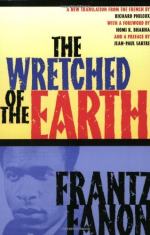|
This section contains 393 words (approx. 1 page at 400 words per page) |

|
1) Why does Frantz Fanon accept—if not advocate—violence as an inevitable tool for social change as compared with, for example, Dr. Martin Luther King who embraced the principle of non-violence?
2) What is the crucial element in a successful native rebellion against colonialism that is often overlooked in the early stages of an uprising?
3) What does Frantz Fanon see as the role of the church, or organized religion, in the case of a popular rebellion?
4) What does Fanon identify as the forces that would restrain a colonial government from an all-out military destruction of an armed civilian rebellion?
5) Why do revolutionary leaders such as Fidel Castro of Cuba and Nikita Kruschev of the USSR effect a persona of barely tamed violence in public places such as the UN?
6) Before an actual armed rebellion erupts in a colony, what are some of the...
|
This section contains 393 words (approx. 1 page at 400 words per page) |

|



